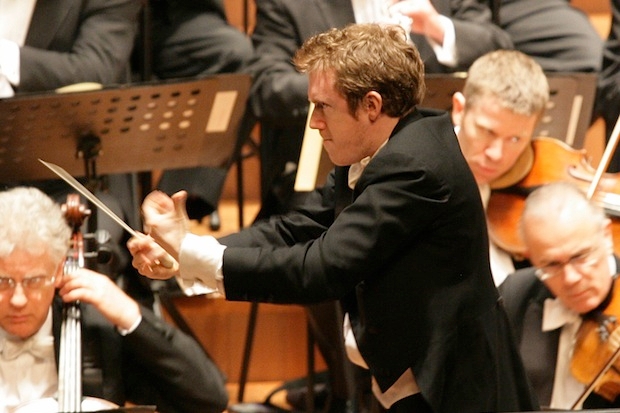There aren’t many operas from which you can extract a single act and make a concert of it, in fact I can’t think of any except ones by Wagner. I’ve been to Act I of Die Walküre, Act III of Die Meistersinger¸ Act III of Parsifal at the Proms, Act II of Lohengrin, and several times to Act II of Tristan und Isolde. It’s not that Wagner’s acts tend to be longer than anyone else’s, they don’t: Handel’s often last as long, so do Rossini’s. It’s rather that some of Wagner’s greatest acts are so rich in musical and dramatic material, so perfectly shaped and have so powerful an impact, quite apart from being extremely demanding of their performers, that it is a luxury to be able to give them all you’ve got and not have to look forward, after an interval of chat and drink, to another draining 80 minutes.
Act II of Tristan would seem to be, perhaps more than any of the others, an ideal case. In the past three or four years we’ve had it under Rattle at the Proms, under Jurowski, and now, at the Barbican, coupled with Schubert’s Unfinished Symphony, under Daniel Harding. On each occasion I have had mixed feelings, up to a point independently of the merits or otherwise of the performance. The one I responded to most ardently was the Prom under Simon Rattle, where the tenor was virtually voiceless, the conducting electrifying.
I suppose that the reason that Act II is thought to be so excerptable is that it has the love duet, which apparently is most people’s favourite part of the work. Yet it is the part that is hardest to bring off. It’s not only a matter of its immense proportions — about 40 minutes, if it doesn’t have the heinous cut that is still common, ten minutes of inspired and indispensable music — but of the series of climaxes, which have to be impeccably scaled if it’s not to turn into a shapeless though exciting mess. The opening few minutes, as Tristan arrives and the lovers are incoherent with ecstasy and relief, can more or less look after themselves. The long passage where the lovers accuse Day of all their sufferings and misdeeds is particularly brilliantly scored, but needs to be shaped as a long decrescendo. The central passage, up to the extraordinary line ‘Then I myself am the world’, requires both delicacy and an enormous climax. Brangäne’s watch song is probably the most sheerly beautiful music in the entire score.
Then follows the philosophical discussion that leads Tristan to his priestly intoning of ‘So might we then together die’, and a long build-up until caution should seem to be blown away in the lovers’ rapture, something that I have only heard brought off in the theatre by Reginald Goodall. After that King Mark, Tristan’s invitation to Isolde to follow him, and the brutal, swift close.
In this performance, things didn’t work out like that. Partly it was the stark brightness of the stage at every point, so that disgusting Day failed to give way to numinous Night. But if, as I think was the case, this was Harding’s first traversal of the score, that showed. He is expert in gaining momentary effects; as almost always I heard many new details in the score. The hysteria of the opening moments of the duet was ideal, but then any sense of shape and line disintegrated. The singers did all they could, and while Iréne Theorin didn’t erase recent wonderful memories of Nina Stemme, she was much more than adequate. Peter Seiffert was in the best voice I’ve ever heard him in, baritonal but never straining, untiring, perhaps a touch phlegmatic. But this was a duet where the lovers remained resolutely separate, which some commentators claim is Wagner’s intention: I don’t agree. And Christianne Stotijn was disappointing in her haloed interruptions.
As quite often, the most moving singing, desperately committed and almost intolerably intense, was from the King Mark of Matti Salminen. He even inspired Seiffert to produce his answer to Mark’s agonised question more probingly than he had sung up to then, and so the last 20 minutes of the act made an impression that nothing before had, despite the competence of the singers and the mostly superb playing of the London Symphony Orchestra, the woodwind especially.
Apart from this particular performance’s shortcomings, I think that the trouble with doing Act II alone is that one gets no strong sense from it, as one most emphatically does if it has been preceded by Act I, of who these lovers are. The contrast between their tormented relationship, only resolved in the final minutes of Act I, and the developing awareness of their true destinies in Act II, is crucial to anything more than a superficial response: that, and the sense at the end of Act II that everything still has to be resolved. No matter how familiar with the work one may be, each encounter with it should be, must be, in a sense a discovery.






Comments